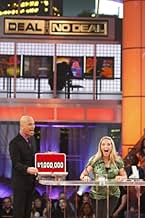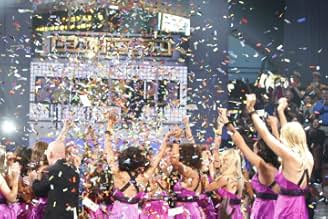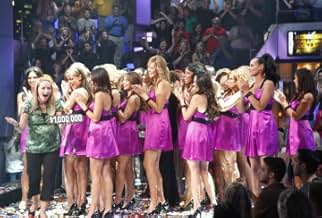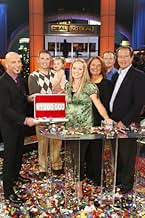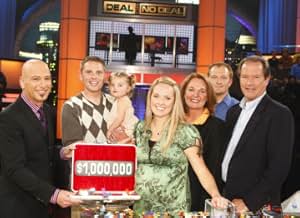IMDb RATING
5.1/10
4.5K
YOUR RATING
Contestants face 26 sums of money, 26 suitcases, and one question: Deal or no deal?Contestants face 26 sums of money, 26 suitcases, and one question: Deal or no deal?Contestants face 26 sums of money, 26 suitcases, and one question: Deal or no deal?
- Nominated for 1 Primetime Emmy
- 2 wins & 9 nominations total
Browse episodes
Featured reviews
What makes a good game show? A good game show is one that the viewer can play at home while watching it on T.V. You can answer Jeopardy questions or you can solve puzzles on Wheel Of Fortune; however - you, as a viewer, really can't do much of anything on this show.
The ONLY exciting thing about this show is the fact that there is big money involved. This is great for the contestant, but the viewer can only live vicariously through the winner.
Seriously, this is only fun to watch when the person loses (or wins) all the money - mostly loses though. It seems that later episodes, the producers put contestants on that had a good sob story (not to diminish them).
I think the reason this game show became such a hit was that they put a pretty good improv comedian (see his early works) as the host and that the games rules are ultra simple - answer only one question (Deal or No Deal).
I can only give this show a rating of 3 because it is the same ole' episode every single time. I can even guess with pretty good accuracy what the banker will offer.
The ONLY exciting thing about this show is the fact that there is big money involved. This is great for the contestant, but the viewer can only live vicariously through the winner.
Seriously, this is only fun to watch when the person loses (or wins) all the money - mostly loses though. It seems that later episodes, the producers put contestants on that had a good sob story (not to diminish them).
I think the reason this game show became such a hit was that they put a pretty good improv comedian (see his early works) as the host and that the games rules are ultra simple - answer only one question (Deal or No Deal).
I can only give this show a rating of 3 because it is the same ole' episode every single time. I can even guess with pretty good accuracy what the banker will offer.
This is, without doubt, the most boring show I've ever seen.
I admit, I've only watched it once, but once was enough to convince me there is a major void in talented game show producers.
The only way I'd watch again is if it was on late/late night and I was having trouble sleeping.
It might be less boring than counting sheep (I suppose).
And that Howie person? Oh please.
zzzzz
(and seriously, all those models...where did they get those things, Stepford Modeling Agency?)
I admit, I've only watched it once, but once was enough to convince me there is a major void in talented game show producers.
The only way I'd watch again is if it was on late/late night and I was having trouble sleeping.
It might be less boring than counting sheep (I suppose).
And that Howie person? Oh please.
zzzzz
(and seriously, all those models...where did they get those things, Stepford Modeling Agency?)
I once used to watch deal or no deal regularly. I watched it every time it came on NBC or any other network, but one day I stopped and thought to myself, did I just succumb to insanity as Einstein defined it, according to Einstein insanity is doing the same thing over and over expecting a different outcome (not verbatim). What does this have to do with this show, well keep reading. Deal or no Deal is a show you become an expert at after watching a couple of episodes. Same story same occurrences but maybe the models might differ from one episode to another but mostly even they are the same. So for me there is no point on watching this show regularly when I can predict what's going to happen. After seeing about five or six episodes of this, I could literally tell what case number the players will choose, and what the banker will offer. For a game show it's not bad. But this is not a show you would never get tired of, or at least be in love with for a long time.
All that happens in this entire show is models holding numbered briefcases walk out, then the host (that famous and hilarious guy who starred in the movie "Walk Like A Man" in like 1981 then disappeared until now) asks the contestant to randomly pick numbers. Then they open those cases. Wow! That's it. The object is to not open the cases with big dollar amounts in them. A completely random game. After each round, the "banker" (a shadowy figure in a booth overlooking the studio floor - possibly one of the host's "Walk Like A Man" co-stars) calls down with an offer to buy the briefcase the contestant selected. Then they have to decide if they will take the offer or shout "NO DEAL!" and put the smack down on a big red button, which is so dramatic a moment I simply cannot put it into words. This show is almost as boring as watching grass grow. It says nothing but horrible things about our society that this random-numbers-guessing-game is a highly rated TV show.
First off,I don't want to sound like some buzz-kill here in regards to this show,or sound like I'm taking this show too seriously. Basically,when and if I watch this,besides the possibility that there's not much else on,I watch this primarily because I'm a student of human nature,and I do find it interesting what--when it comes to money--is any given individual's "breaking point" is. Sometimes I put myself in the place of the contestant,where I would or wouldn't deal. Sometimes I put myself in the role of Howie(and he does a very good job as the host,one part friend,one part Devil's advocate,lighter on the advocate). I even occasionally put myself in the role of one of the Oh-so-Gorgeous models(don't ask)! Much of the time,though,I'm usually just watching to guess what the Banker would do,figuring how much he would offer according to which cases have been opened.
The falsehoods I'm referring to--and thusly,why I feel like this show is equally,if not more so,head-banging and frustrating in nature--are some very important little notions and precipices that this show so famously stands atop. I've narrowed down the offenders to three biggies:
1. Each contestant is playing for a Million Dollars. While in principle,this is a correct assertion,more realistically and literally,the contestants are more playing to see how much they can make off the BAnker's offers. At it's heart,this show is adversarial,and few contestants leave with what's in the case they select(and usually,when they do,it's WAY less than they wanted).
2. That the case boards are easy to read. For example,just because someone eliminates a fair cluster of small amounts,particularly early,means that the board IS a player's board. By contrast,just because a number of large amounts are off the board at the start,DOESN'T mean the board cannot be favorable. In other words,in a game of probabilities,just because the high odds might favor the player ISN'T in and of itself a good tell of whether or not a player should deal.
3. After the deal has been made(and often it is),the host will ask the contestant what he or she would've taken if they'd gone on. Ponder that for just a second. Unless the contestant in question had a map plan of which cases they would've taken and when,this is a HUGELY false device,meant to instill a sort of "What if...?" twist to the end-game that is neither truthful or necessary.
There are more minor examples of these:magical thinking devices that are to somehow fool the contestant(And by proxy,the audience)into thinking that this is(or is supposed to be)ruled by something other than happenstance or luck;the assumption that the contestants are all somehow "average" people,when it seems like there is a definite type of people who are selected(usually,that connotes a person who possesses a lot of enthusiasm,good luck charms,loud, resolute family members and friends and stays pretty light on such meaningless stuff as intelligence,particularly in math,pretty SUB-average IMHO). I guess what I'm trying to say,in sum,is that this show is a perfectly okay wasting of an hour's TV time,but you might want to keep in mind that this is as much(if not more so)sideshow and theatrics as it is any sort of chance for people to get rich. Do that,and the viewing of DoND will go down a lot easier,particularly if you are not their type of contestant material.
The falsehoods I'm referring to--and thusly,why I feel like this show is equally,if not more so,head-banging and frustrating in nature--are some very important little notions and precipices that this show so famously stands atop. I've narrowed down the offenders to three biggies:
1. Each contestant is playing for a Million Dollars. While in principle,this is a correct assertion,more realistically and literally,the contestants are more playing to see how much they can make off the BAnker's offers. At it's heart,this show is adversarial,and few contestants leave with what's in the case they select(and usually,when they do,it's WAY less than they wanted).
2. That the case boards are easy to read. For example,just because someone eliminates a fair cluster of small amounts,particularly early,means that the board IS a player's board. By contrast,just because a number of large amounts are off the board at the start,DOESN'T mean the board cannot be favorable. In other words,in a game of probabilities,just because the high odds might favor the player ISN'T in and of itself a good tell of whether or not a player should deal.
3. After the deal has been made(and often it is),the host will ask the contestant what he or she would've taken if they'd gone on. Ponder that for just a second. Unless the contestant in question had a map plan of which cases they would've taken and when,this is a HUGELY false device,meant to instill a sort of "What if...?" twist to the end-game that is neither truthful or necessary.
There are more minor examples of these:magical thinking devices that are to somehow fool the contestant(And by proxy,the audience)into thinking that this is(or is supposed to be)ruled by something other than happenstance or luck;the assumption that the contestants are all somehow "average" people,when it seems like there is a definite type of people who are selected(usually,that connotes a person who possesses a lot of enthusiasm,good luck charms,loud, resolute family members and friends and stays pretty light on such meaningless stuff as intelligence,particularly in math,pretty SUB-average IMHO). I guess what I'm trying to say,in sum,is that this show is a perfectly okay wasting of an hour's TV time,but you might want to keep in mind that this is as much(if not more so)sideshow and theatrics as it is any sort of chance for people to get rich. Do that,and the viewing of DoND will go down a lot easier,particularly if you are not their type of contestant material.
Did you know
- TriviaOn the 1 September 2008 episode, Jessica Robinson became the first contestant ever to win the $1,000,000. She turned down an offer of $561,000. The only remaining value left was $200,000. (Season 4, Week 2.)
- ConnectionsFeatured in Screenwipe: Episode #1.2 (2006)
Details
- Release date
- Country of origin
- Language
- Also known as
- Deal or No Deal UK
- Filming locations
- Production companies
- See more company credits at IMDbPro
Contribute to this page
Suggest an edit or add missing content




